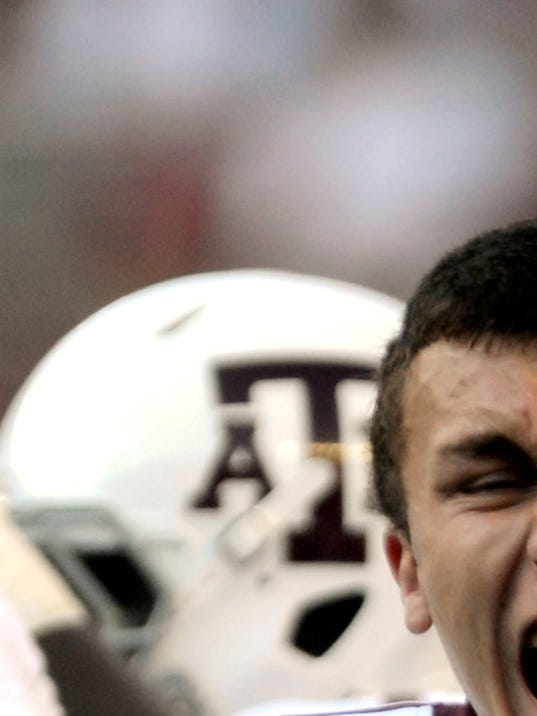Wait...what...?
Just follow me on this one.
Johnny Manziel is currently under investigation by the NCAA for making money by selling his autograph.
***Let’s just pause right there. This has nothing to do with this article but...is that not most un-American thing you have ever heard?
The Johnny Football (others call him Johnny Heisman, I prefer Johnny Lohan) situation has led to hours and hours of sports talk radio discussion about how Universities and the NCAA should deal with celebrity college athletes. Yes, it is un-American that Johnny can’t make a few extra dollars signing footballs, but the sad truth is that there are way to many people who care way to much about their college sports teams to open that door. But this discussion only really applies to 2 sports, and my point here is about the non-revenue sports - most specifically soccer.
The NCAA, whether you agree with them or not, has pages upon pages of rules that deal with “benefits”. The obvious purpose of those rules is to create a “level playing field” between those who, like Alabama and Ohio State, have literally bottomless coffers like, and those who do not (another side note: As if there is a level playing field between, let’s say, Alabama - every game will be on national TV, there is a waterfall in our locker room, 90,000 fans on Saturday - and, let’s say, the University of Akron - game broadcast locally on the radio, waterfall-less locker room, even if you win every game 96-3 you won’t play in the National Championship). However, its not those rules that I want to discuss here - it’s the student athlete rules that pertain to our World Cup discussion.
I played NCAA div. 1 soccer for a program that did not even sell tickets to our matches. We were the epitome of a non-revenue sport. However, each August, we had to sit in our locker for 2 hours while the compliance director of the school would talk to us about what we were and were not allowed to do as student athletes. The majority of those rules who put in place for football and basketball reasons (we did not have “boosters” for our soccer program), but negatively affected the rest of us. For example - those students who were on scholarship were only allowed to work during the school year to earn the amount of money that was equal to the difference between their scholarship and the cost of tuition + room and board. So if, for example, a student athlete who is on full scholarship wants to buy his girlfriend an engagement ring then he must earn that amount of money during summer break. There were some rules that were meant to protect the “student” side of the student athlete. For each sport there is a maximum number of contests a team can play in a given season. There is maximum number of hours each team can spend on the practice field. There is a maximum number of days that a team can spend in practice during the off-season. As an NCAA athlete I could not play or practice with another team, such as a club team, while school was in session. As the NCAA commercials used to say, “there are x-thousand NCAA student athletes, and almost all of them will go professional in something other than sports.” These rules increase the likelihood of a student athlete succeeding in the classroom, yes, but there is another necessary outcome of these rules - they stunt one’s growth as an athlete.
An NCAA athlete is stuck within the system and a ceiling is placed over his or head. The NCAA is quick to point out that “student” always come before “athlete”. And this is why we will never win the World Cup.
If a 16 year old American high schooler shows real promise on the soccer field his parents and his teachers and his tutors will do everything they can to help that student succeed in the classroom so that he or she can pass the clearing house (a system that the NCAA uses to determine an incoming high school student’s eligibility to play at the div. 1 or div. 2 level based on a sliding scale of SAT or ACT scores and GPA) so that he or she can play at the highest level in college. That athlete will then be required to go to class, pass a certain number of classes, and be limited in the number of practice hours and the number of games he can play. If that same 16 year old is in Europe or Latin America he goes to school to learn soccer. Actually, he would enter the system much earlier than 16. Ajax in the Netherlands and Taihuichi in Bolivia are 2 places that are famous for their development academies. And when you have soccer crazy nations that are developing their players in this manner, we will never be able to compete.
At this point all of you non-sports fans are sticking your chests out and saying, “thankfully we have our priorities in the right place.” Easy on the ethnocentrism there Suzy Patriot, there is not a whole lot that right about kids making billions of dollars for a group of adults while they are being “compensated” with free classes, free food, and free bunk bed in a stanky college dorm room - all the while being prevented from selling their own scribble of their own name.

No comments:
Post a Comment